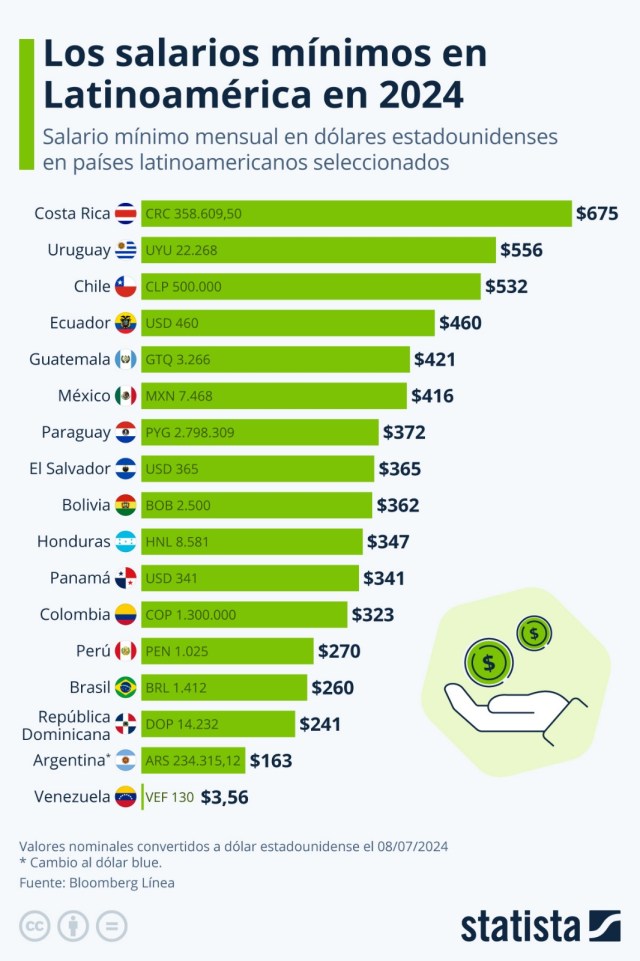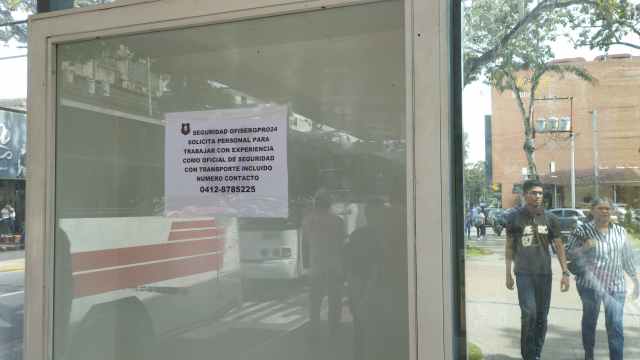Source link : https://theamericannews.net/america/venezuela/grueling-work-days-and-miserable-wages/
Lapatilla
diciembre 08 2024, 1:25 pm
In many commercial establishments in the center of Maturín it is common to see advertisements requesting preferably young personnel, since they have little knowledge about their rights as workers. Photo: Jefferson Civira
The labor conditions of workers in Venezuela can only be described as “extremely poor” and is caused by the situation in which they find themselves today, according to the lawyer specializing in labor matters, Ramón López. It is no secret that the nation occupies the last place in the salary ranking of Latin America, with salaries even below Cuba and Haiti.
By: Correspondent lapatilla.com
¡Únete al club ahora! Suscríbete al boletín más importante de Venezuela
Nicolás Maduro’s regime, despite calling itself “workerist” and defender of the working class, has maintained the same minimum wage since March 2022, that is, 130 bolivars. At that time, this amount was equivalent to about 30 dollars per month. That salary at the official exchange rate of the Central Bank of Venezuela, as of December 5, 2024, is only equivalent to 2.70 U.S. dollars.
Given the de facto dollarization that the country lives under, some businesses pay their employees in US currency or its equivalent in bolivars, but the vast majority pay their workers with amounts that are barely enough to buy food. Despite the poor pay, workers are subjected to enslaving schedules of 12 hours a day and only one day off a week.
This is the case of those who work in Asian owned grocery stores and supermarkets, better known as “los chinos” (the Chinese) who, for example, in the case of Maturín, earn an average of between 38 and 40 U.S. dollars per week. Those who work in these types of establishments do not have a collective contract, vacations or profit sharing, despite being contemplated in the Organic Law of Labor, Workers and (female) Workers (LOTTT) as enacted and modified by Chavismo in 2012.
According to article 173 of the LOTTT, the workload of a worker must be five days a week, eight hours a day, and may not exceed 40 hours a week, and thus the employee will have the right to two continuous and paid days of rest.
 According to data from the Bloomberg Online news agency, in July of this year, Venezuela was in last place among Latin American countries for having the lowest minimum wage, a position it currently maintains, as it hovers around 2.70 dollars per month.
According to data from the Bloomberg Online news agency, in July of this year, Venezuela was in last place among Latin American countries for having the lowest minimum wage, a position it currently maintains, as it hovers around 2.70 dollars per month.
However, in practice, the reality is very different: those who work in Asian supermarkets if at all have a single day off a week and the average daily workday is 12 hours, without receiving payment for overtime, night hours or a weekly day off.
Modern slavery?
Most of these businesses hire the services of external security companies, who recruit personnel to work as officers or guards, and who are even worse paid, as they only earn an average of 100 dollars per month and have one day off for every 15 days worked. These employees also do not have benefits such as vacations, profit sharing or food bonuses.
Although the Lottt establishes some exceptions regarding the work day, these are not fulfilled either, since in article 176 it states that “when the work is continuous and is carried out in shifts, its duration may exceed the daily and weekly limits established, and the total hours worked by each worker may not exceed an average of 42 hours per week.”
The aforementioned article establishes that each week that includes six days of work must be compensated with an additional day of vacation, with payment of salary and without impact on the vacation bonus.
 One of the most enslaving jobs is that of security officer, which Asian merchants hire externally through other companies and whose salaries do not even reach $120 per month. Photo: Jefferson Civira
One of the most enslaving jobs is that of security officer, which Asian merchants hire externally through other companies and whose salaries do not even reach $120 per month. Photo: Jefferson Civira
Forsaken by the State
For the President of the Confederation of Workers of Venezuela (CTV) in Monagas State, Héctor Villalba, the situation that workers are currently experiencing is regrettable, since he believes that the majority of merchants are in flagrant violation of the Lottt.
“One takes the Labor Law, throws it in the air and wherever it falls, that article is violated by many employers, amply violating the rights of workers. Regrettably, in the instances of defense of workers’ rights, very little is done there in terms of looking after each worker, and when it is done, it is very late,” said Villalba.
The CTV representative stated that nothing established in the Lottt as reformed and enacted in 2012 is currently being complied with, a situation that he attributed to the economic policy that, in his opinion, has generated a “deteriorating” culture in the way of life of workers.
“This economic policy is negatively changing the social culture of workers. At this moment, today November 26th, (when this interview was conducted) the minimum wage for workers in dollars is 2.8 dollars and falling, because the dollar increases every day,” said Villalba.
Faced with these meager salaries, both in the public and private sectors, many people opt for the informal economy. In the case of Maturín, advertisements can be seen in a large number of businesses, where they request personnel, mainly between the ages of 18 and 25.
In other times, it was during the Christmas season when companies used to hire more personnel due to the increase in sales and economic activity. However, the posters asking for employees remain posted for almost the entire year, as young people prefer to emigrate or work in the informal economy rather than earn “miserable wages,” as many people call it, in addition to the more than 70 hours a week they are forced to work.
 Among the job applications, the one that is most likely to be found in different parts of the city center is that of security officer. Photo: Courtesy.
Among the job applications, the one that is most likely to be found in different parts of the city center is that of security officer. Photo: Courtesy.
In recent days, the President of Fedeindustria (industrial trade union), Orlando Camacho, stated that in Venezuela there is no worker who earns less than 200 dollars a month, statements that he offered in an interview through a Chavista propaganda portal, Venezuela News. These assertions generated a wave of criticism of this “businessman” who is a loyal acolyte of the regime, where people questioned such assertions, stating that these are completely out of touch with reality.
According to Camacho, the average income of Venezuelans ranges between 200 and 2,000 dollars per month, but he did not mention professionals such as a university professor whose income is around 90 dollars, including the so-called “war bonus” that has no impact on social benefits such as pensions.
According to the Chavista “businessman”, in recent months the salary difference between a public employee and a private one has been reduced. He indicated that, in the case of public workers, the average monthly income is 150 dollars, plus other benefits such as food and transportation.
Many hours and little pay
For his part, the labor lawyer, Ramón López, said that he does not know any worker whose minimum salary is 200 dollars per month. In his case, he worked 44 years in public administration with a specialization in Labor Law and remembers that, in 1984, his salary was equivalent to 2,600 dollars, but today, as a retiree, he receives less than 3 dollars per month.
Thanks to the fact that he continues to work as a lawyer in the private sector, he is able to support himself, but not as much as he would like due to the dire economic situation of the country. He says that if he depended on his retirement pay, he would be destitute.
The legal professional agrees with the president of the CTV in Monagas that, in addition to not complying with the Organic Law of Labor, what is established in articles 90, 91 and 92 of the Constitution is not complied with either.
 In many Asian stores, workers are subjected to work days of at least 12 hours a day, without payment for overtime or night hours. Photo: Courtesy
In many Asian stores, workers are subjected to work days of at least 12 hours a day, without payment for overtime or night hours. Photo: Courtesy
The lapatilla.com team spoke with a young woman who worked for several months as a security officer in an Asian supermarket, as a result of what she considered “labor exploitation,” she decided to quit and work on her own selling candy. She only earned $50 a fortnight and barely two days off a month for daily shifts of even more than 12 hours, since she started at 8:00 in the morning and in some cases left as late as 9:00 at night.
“It seemed like slavery to me after several months working there, earning barely $100 a month with no other benefits. I had to stand all day and I came home very tired, I hardly spent time with my 5-year-old son, who I left with his grandmother. I still see notices posted at bus stops and at the entrances of Chinese stores looking for staff, the only thing missing is that they ask for shackles as a requirement to work, because if only they paid well. But no, it is a pittance that is not enough for anything,” says the young woman who preferred not to identify herself so as not to be subject to reprisals.
While many workers are exploited and subjected to long working hours in exchange for ridiculous wages, Nicolás Maduro’s regime boasts of being a faithful defender of the rights of the so-called “working class,” which it keeps oppressed receiving the lowest wages in Latin America. The excuse for Chavismo in the last two years for not raising the minimum wage continues to be “the economic blockade and sanctions” imposed by the United States.
On two occasions, detailed information on the situation of the workers in Monagas was attempted to be obtained directly from government sources, but it was not possible to speak with the labor inspector. On both occasions, the lapatilla.com reporting team was notified that she was not in the office.
Author :
Publish date : 2024-12-08 04:25:00
Copyright for syndicated content belongs to the linked Source.
—-
Author : theamericannews
Publish date : 2024-12-08 18:10:49
Copyright for syndicated content belongs to the linked Source.